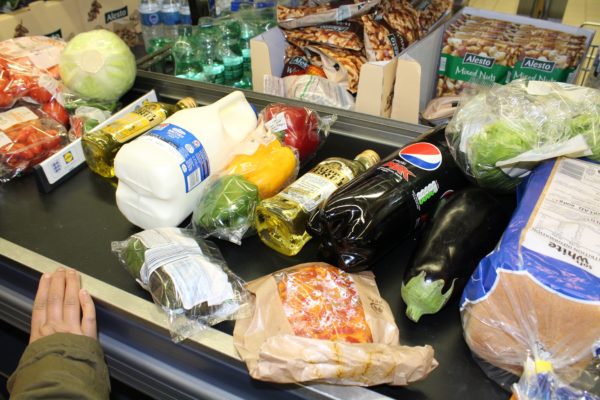With Thanksgiving on the near horizon and the December holidays a month away, many people are putting a seasonal emphasis on meal planning for gatherings of family and friends. However, anyone who”™s been to the grocery store lately will certainly be aware of the steep increase in food prices, and there is little evidence that prices are going to be slashed for the holidays.
Susan Mazrolle, consulting registered dietician with the Big Y supermarket chain, hosted a recent Zoom webinar to discuss how a shift in shopping and cooking habits can help consumers save money on groceries.
“Food prices are up about 12.5% since last year,” she said. “The overall inflation rate is 7%, so the grocery world is even worse. I was just reading a blog the other day and it said turkey prices are up 23% ”” that”™s our Thanksgiving meal centerpiece ”” and eggs are up 30%, butter is up in the 10% to 20% range.”
To combat the inflationary hike, Mazrolle recommended approaching grocery shopping with an advanced strategy.
“We really have to be a smarter shopper, and we have to think about planning,” she continued. “I think it was Ben Franklin that said, ”˜If you fail to plan, then plan to fail.”™”

For starters, Mazrolle recommended creating a weekly meal planner that will detail what will be served for breakfast, lunch and dinner ”” thus, there is an understanding of which specific foods will need to be obtained. She also advocated checking the grocery store”™s weekly print circular or downloading the store”™s app to obtain coupons for any special promotions.
Mazrolle also suggested limiting the amount of grocery runs during the week.
“The more times we go to the grocery store, often the more things end up in our cart that we didn”™t really intend,” she said. “We buy by impulse, we buy by sight, things look good, or we”™re hungry ”” we really need to be careful about not shopping when we”™re hungry.”
“Sometimes we need to go shopping by ourselves,” she added. “Sometimes our kids want to throw things in the cart. I had one lady that says, ”˜I hate shopping with my husband, he”™s always throwing things in that aren”™t on my list.”™”
While in the store, Mazrolle advocated for shoppers to consider store brands, also known as private label brands, that are positioned next to highly advertised brands. She observed the store brands were not inferior to the more familiar products but were often the exact same item.
“Many of these products are actually produced by major manufacturers,” she said. “Years and years and years ago, I worked for Ocean Spray and we would make private label products of cranberry juice for other grocery stores. This is very common ”” you often will find that the products are just as good as a name brand, but they”™re less expensive because you”™re not spending all that money on advertising.”
Furthermore, Mazrolle pointed out that consumers often lose money on groceries when they buy items but later let them spoil and throw them out half-eaten or never consumed. She pointed to data that showed 43% of food waste in the U.S. comes from homes.
“It”™s estimated that the average family of four wastes over $1,000 every year in food that goes bad and gets thrown away,” she said. “Think of how often you might have a quarter of a bag of mixed salad greens, and they”™ve gotten kind of gooey and are thrown in the trash. You would never throw a quarter down the trash.”
In planning meals, Mazrolle spoke about making creative leftovers using meat, poultry and vegetables. She cited a personal example of buying a rotisserie chicken for dinner and using the leftover chicken to create chicken fajitas, chicken tacos and chicken fried rice.
Mazrolle also urged consumers to avoid the belief that eating out is more cost-effective, noting that cooking at home was not only more economical in the long run, but it could also result in money being saved on medical bills.
“The more we cook at home, not only do we have control over our budget, we have control over our sodium intake and over our saturated fat intake,” she said. “We can eat more fiber, we can eat more fruits and vegetables. So as far as nutritional quality goes, for the most part, eating at home is really so much more healthy for us.”
Big Y is headquartered in Springfield, Massachusetts, and operates 70 supermarkets, 39 pharmacies, Fresh Acres Market, Table & Vine Fine Wines and Liquors and nine Big Y Express Gas and Convenience locations across Connecticut and Massachusetts. Within Fairfield County, Big Y has stores in Bethel, Monroe, Newtown, Shelton and Stratford.



















